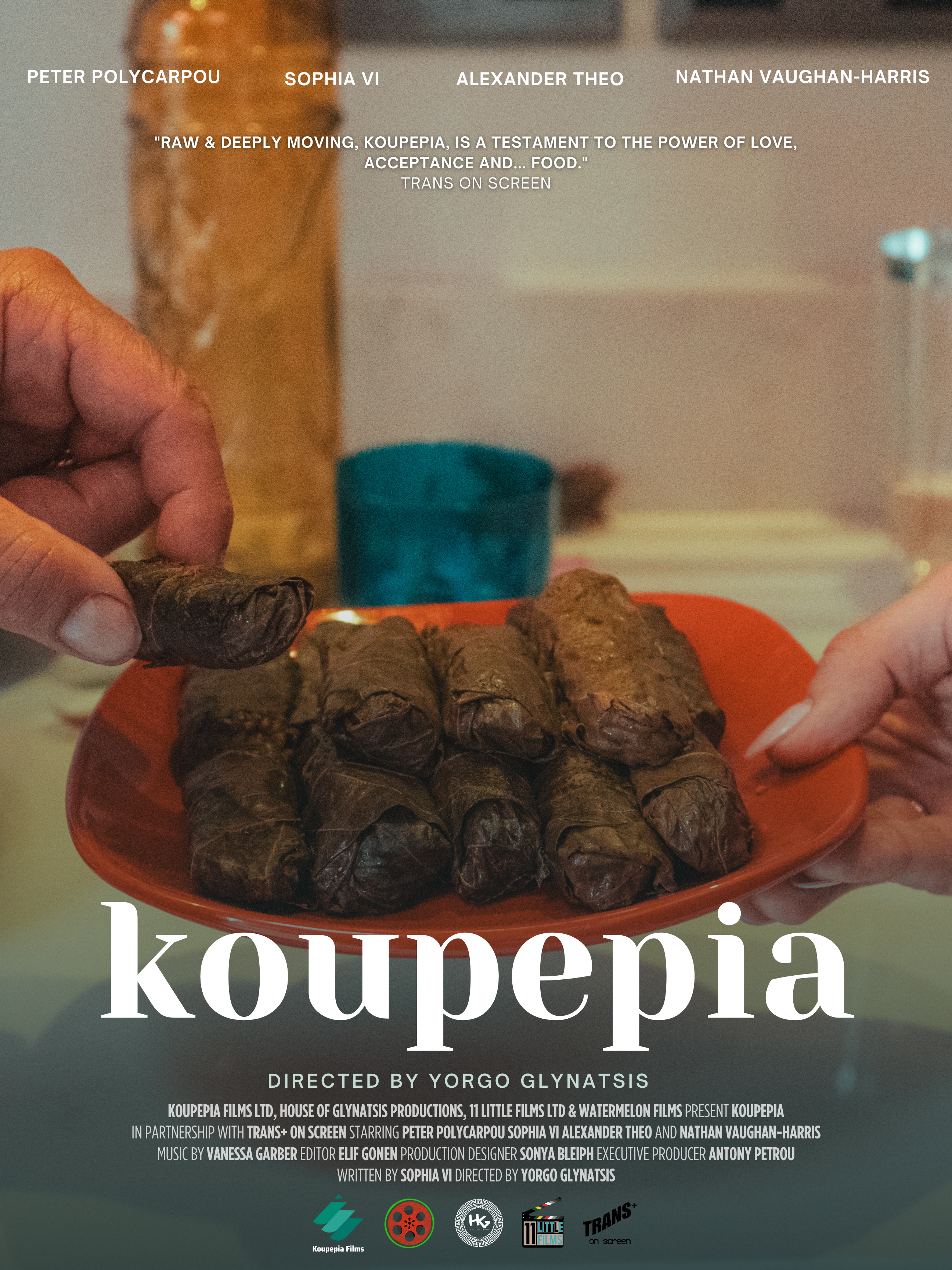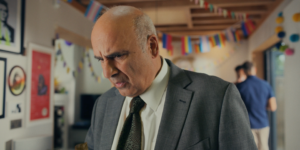
Short Film Review “Koupepia”
WATCH THE TRAILER BELOW
First, the Recap:
Leniency. It should obviously be understood in this world that we ALL have things we will just simply disagree with. We all have our certain beliefs, preferences, chosen faiths (or none), etc that at least SHOULD constructively aid in defining us as the individuals we are. Yet, when we do still find ourselves being hesitant or unwilling to at LEAST be open-minded enough to disagree in a more calm and beneficial way as opposed to judgement (veiled or otherwise) and sadly even hate or total rejection, what does it take to shake us up enough to see bigger and better truths about ourselves–and others? Petros (Peter Polycarpou), recently widowed, is attending his son Michael’s (Alexander Theo) engagement party to partner David (Nathan Vaughan Harris). With plenty of awkwardness to go around, an unanticipated conversation with Eleni (Sophia Vi) will alter Petros’ entire perspective on who he, his son, and grander heritage really is, and should be.
Next, my Mind:
Lifestyle choice clashes with familial legacy, the weight of even the smallest amount of intolerance, and the requisite need for an altered viewpoint on how life will move forward between a father and son thanks to this briskly paced but abundantly filled-out 11-minute short film effort from director/producer Yorgo Glynatsis, writer/producer Sophia Vi, and producer Antony Petrou that definitively ascends above and beyond its core LGBTQ-centric leanings and effectively creates another example of lessons that are more than applicable to ANYONE in the world to absorb, contemplate, and ideally put into practice. It’s a cinematic approach that, at least for this critic, has truly impacted me quite conclusively, having made it clear in a multitude of past reviews involving films that are coming from this foundational perspective not being a personal preference of mine. But, is this NOT the beauty of indie film and those within the community that they can still boldly stand for what they are and the stories they wish to tell, but do so in a manner that isn’t remotely “soapboxing” but rather basic human truths we should ALL find a better means to embrace?
Here, the narrative we are viewing follows a recently widowed father attending his gay son’s engagement party and not having the best time of it until a chance encounter with one of the guests combined with a particularly delectable, traditional Cypriot dish not only ends up eliciting a reminiscent state of mind for him, but a newly founded, more open MINDSET about the elements in life that are most important to remember and support, even IF not FULLY accepting ALL of it, while additionally learning TO “see” his son’s decision with far more grace than he originally had. The deft utilization of food as a human bonding tool works decidedly well, a highly relatable scenario we could all most likely recall experiencing ourselves in some form, much less how the cultural significance of it having been prepared correctly manifests into another unanticipated doorway of mutually shared enjoyment, recollection, challenge, and understanding. Plus, I simply admire the film’s willingness to address the awkwardness of the situation at hand, as it only makes the story that much more accessible to anyone who’s found themselves in such a dilemma.
As would likewise be expected, there’s the beautifully orchestrated instances of unconditional, even if showing somewhat muted or “buried” in the character’s interactions initially, love between a parent and child, and that always resonates deeply with me when I consider my own relationship with my parents over the years, having lost one 2 years ago, and the void that is left from it while the closeness to the other is now stronger than ever. I felt this aspect of the narrative is very much present, and even as the notion OF a parent being advised by a total overall stranger to take a hugely valid and imperative step associated with his son’s upcoming wedding really speaks to how sometimes we as people NEED that push to make choices that aren’t actually difficult, but are MADE so by our own hesitations to bear with what we might not agree with, much less wholly endorse. Amidst all the more serious tone the film carries, the film adeptly saves one specifically hysterical moment for the finale, which just FITS perfectly into the events without feeling intrusive and/or out of place. It’s glorious, perhaps reminding us to LIGHTEN UP more!
The music score stood out for me as well, as it adds such a playfully spirited atmosphere to what, again, is a more dramatically introspective foray in the grander scope of events depicted. Polycarpou easily, plus with truly unassuming energy and impactful intent, presents a wonderfully affecting portrait of fatherhood, the struggle to champion a son’s choices, the burden of his own loss, and the revelatory nature of an unanticipated conversation accompanied by the associated moments of connection it establishes through his role as Petros, a man feeling out of place amongst that which he just won’t totally avow. Even as his son attempts to make his beloved father a part of the event, Petros’ awkward but stalwart resistance seems unwavering–at least until he meets Eleni who transforms his entire outlook of things while they both relish a united love of a traditional Cypriot dish Eleni made for the proceedings. What comes of this interaction re-shapes Petros’ entire mood and viewpoint of not only his son’s orientation, but of his own cultural heritage in a fresh way, and Polycarpou unequivocally sells you on this change through his performance.
Vi correspondingly shines brightly, exuding such a magnificently grounded, engagingly stirring and expressive performance as Eleni, a British Cypriot transgender woman who turns into a catalyst for transfiguration of attitude for Petros upon randomly meeting him while he’s devouring the koupepia she’s cooked up for the event. As she subtly coaxes their discussions on, Eleni shares about her own treasured heritage, love of food, but more importantly (and boldly!) notions about the need for Petros to be far more aware and active in his son’s upcoming wedding while also encouraging him in a forward but lovingly purposeful way to consider the thoughts and feelings he REALLY needs to tell his son, much less to share at the ceremony. How this straightforward, calmly insistent, completely heartfelt dialogue between them ends up is a winning exploration of fundamental human dynamics the way it really should be, and watching Vi carry this air of utter affability paired with a still-present authoritative inner strength is a gift to watch, as it suits the story SO artfully and pertinently.
Primary supporting roles arrive first from Theo as Petros’ son Michael, a happily engaged man whose party for his upcoming wedding his father is now attending. Micheal has his times to try and make his father realize how glad he is that he’s there, but the lack of genuine desire TO be there eludes the efforts Michael puts forth until a circumstance occurs that will change everything. Harris is Michael’s soon-to-be life partner David, who also makes every possible bid to make Petros feel welcome and a part of everything but runs into the same brick wall Michael had at first. Additional supporting appearances are made by Santi Sorrenti, Mike Televantos, Adrian Rambla, Reema Huzair, Zane Haq, Andreas Pavlou, Michela di Felice, and Natalia Campbell. So, in total, “Koupepia” creatively, skillfully, and efficaciously traverses its basic LGBTQ themes while transcending them to examine the concepts of views on lifestyle orientations, past and present relationships, cultural conventions, the love of food, the power of remembering, and perhaps the ultimate lesson to be learned–seeing two different people, from two different worlds and arenas of thought, coming together and discovering what so many of us would most likely find out as well if we would just be open to it as PEOPLE–common ground.
STAR RATING (out of 5):
As always, this is all for your consideration and comment. Until next time, thank you for reading!






